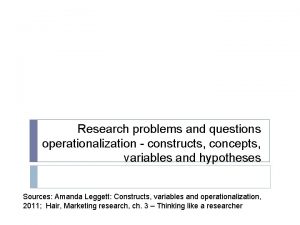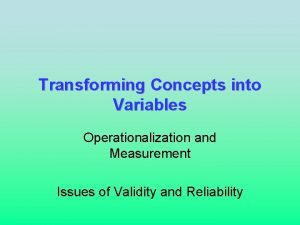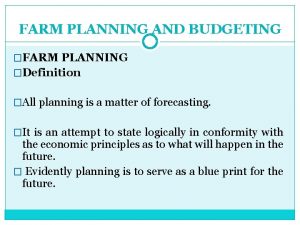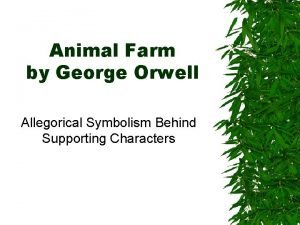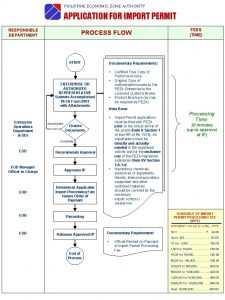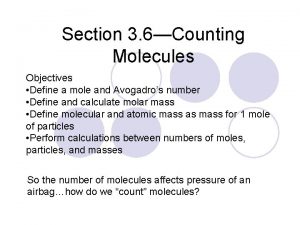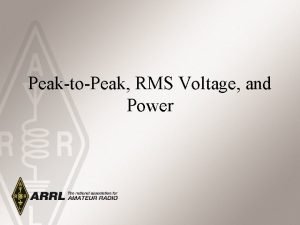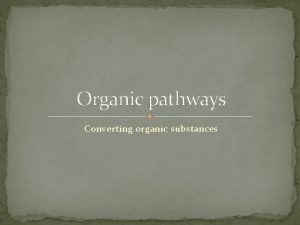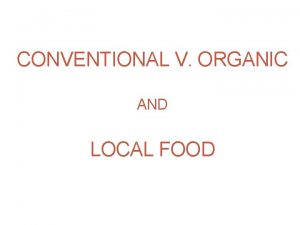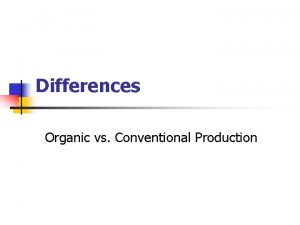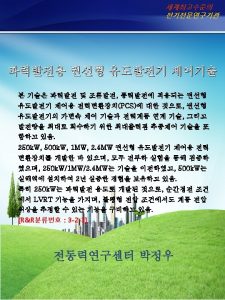CONVERTING OF CONVENTIONAL FARM INTO ORGANIC FARM Organic










- Slides: 10

CONVERTING OF CONVENTIONAL FARM INTO ORGANIC FARM

Organic farming • Also called Low input Farming. • Crops and Livestock Production using natural sources of nutrients (Such as composts, Crop residues, manures). • It involves natural method of pests and weeds control. No use of synthetic or Agrochemicals. • This system relies on ecological processes, Biodiversity and cycles adapted to local conditions.

What does “Organic” mean? • Production without synthetic fertilizers, herbicides, insecticides and fungicides on land that has been free of synthetic chemicals for at least 3 years, in general. (Regulations can vary from country to country) • Organic livestock raised for meat, eggs and dairy products must have access to outdoors and given organic food. Free from Antibiotics, growth hormones or any animal by-products.

Why to choose “Organic”? • • Environment friendly No health risks for Humans, Animals, Plants Freshness and better quality Richer in nutritive value Economically suitable for Long run Better utilization of Local or Natural resources Relatively cheaper that using chemicals

- Steps to be followed • Get information first (Where to find. . ? ) • • Sharing information with other farmers. Training or extension services Books and Booklets Radio, Television, videos and other mass media. • Basic things they need to know is about; improving soil fertility, keeping crops healthy, increase farm diversity, keeping livestock healthy and How to give value to organic products and how to successfully sell them.

• Getting familiar with Organic practices • • • Mulching Intercropping Composting Green manuring Organic pest management Appropriate seeds and Planting material Planting of leguminous crops and trees Growing farm-own Animal feeds Terraces and Soil bunds

How to start implementing Organic practices? • Implementation on small area first • Focus on choosing crops that can easily be integrated into the existing farming system and will contribute to it’s improvement. • It can also be depends on farmer’s knowledge on the right management of crops, family needs and demand of the crop in market. • During conversion, basically farmers should select crops with low risks of failure such as cereals and legumes over High-value short term crops.

• The crops to grow for sale should include crops that can be sold on local market as well as urban areas. • Careful selection of varieties. • Planting on hedges; other crops and/or Trees helps to diversify farming system. • Growing leguminous green manures helps to restore soil fertility.

• Full conversion to Organic farming • Overall emphasis should be given on; improving soil fertility, encouraging positive interactions between all parts of production systems, Optimizing the balance between feed production and livestock and Mitigating contamination risks….

THANK YOU
 Operational definition in research example
Operational definition in research example Converting concepts into variables
Converting concepts into variables Farm budgeting definition
Farm budgeting definition Uses of farm structures and buildings
Uses of farm structures and buildings What does foxwood farm represent in animal farm
What does foxwood farm represent in animal farm Peza form 8105 sample
Peza form 8105 sample How many grams in a mole
How many grams in a mole Moles to molecules
Moles to molecules Converting grams to moles
Converting grams to moles Parts of galvanometer
Parts of galvanometer Peak to rms conversion
Peak to rms conversion
